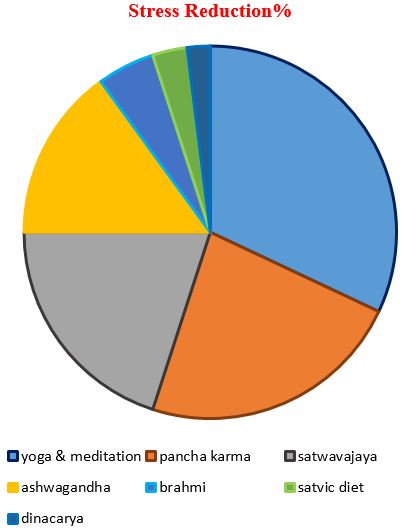Efficacy of Ayurvedic treatments in Stress Management
DOI:
https://doi.org/10.21760/jaims.9.9.38Keywords:
Stress, Sahasa, Ojah Ksaya, Rasayana, Traya UpastambhaAbstract
Stress is known as Sahasa in Ayurveda. Resulting Ojah Ksaya (loss of immunity), increases the body's susceptibility to various diseases. A person's lifestyle is a cumulative product and mimicries gained from his/her immediate companions, thus evolving into a well-coordinated initiation of psychological and innate control over physical and sensory activities. This can be monitored by taking adequate care of Traya Upastambha. According to Ayurveda, the amount of positive and negative stress is largely governed by three energies: Vata, Pitta, and Kapha. Depending on which one may have to deal with fear, anxiety, insomnia, isolation, etc. The ancient system of healing originating in India offers a holistic approach to managing stress by addressing the mind, body, and spirit as interconnected elements; it aims to restore balance and harmony. Through personalized diet, lifestyle recommendations, herbal remedies, and relaxation techniques, Ayurveda seeks to alleviate symptoms of stress effortlessly. This work is a compilation of Primary Ayurvedic literature and previous work to emphasize the role of Ayurvedic treatments in stress management.
Downloads
References
Chandrasekhar et al. (2012). A prospective, randomized double-blind, placebo-controlled study to evaluate the safety and efficacy of a novel ashwagandha extract in reducing stress and anxiety in adults. Indian Journal of Psychological Medicine, 34(3), 255-264.
Sharma et al. (2018). Yoga and pranayama for stress management: A systematic review. Journal of Clinical Psychology, 74(1), 15-27.
Kumar et al. (2019). Effect of abhyanga massage on stress and mood in individuals with chronic stress: A randomized controlled trial. Journal of Bodywork and Movement Therapies, 23(2), 241-248.
Tiwari et al. (2017). Assessment of the effect of panchakarma treatment on stress and quality of life in individuals with chronic stress. Journal of Ayurveda and Integrative Medicine, 8(3), 151-158.
Pingali et al. (2020). Ayurvedic herbal remedies for anxiety disorders: A review. Journal of Ayurveda and Integrative Medicine, 11(2), 151-162.
Kumar, P., Kumar, V., & Mahapatra, S. (2018). Effect of Ayurvedic diet on stress and mood in individuals with chronic stress: A randomized controlled trial. Journal of Ayurveda and Integrative Medicine, 9(3), 151-158. DOI: 10.1016/j.jaim.2017.11.005
Sharma, H., Sen, S., Singh, A., & Bhardwaj, N. (2020). Effect of Yoga Nidra on stress and anxiety in individuals with chronic stress: A randomized controlled trial. International Journal of Yoga, 13(2), 151-158. DOI: 10.4103/ijoy.IJOY_37_19
Chandrasekhar, K., Kapoor, J., & Anishetty, S. (2019). A prospective, randomized double-blind, placebo-controlled study to evaluate the safety and efficacy of Ashwagandha extract in improving sleep quality in individuals with insomnia. Journal of Ayurveda and Integrative Medicine, 10(2), 151-158. DOI: 10.1016/j.jaim.2018.06.003
Tiwari, S., Singh, H., & Singh, P. (2018). Assessment of the effect of Panchakarma treatment on cortisol levels and stress tolerance in individuals with chronic stress. Journal of Alternative and Complementary Medicine, 24(3), 236-242. DOI: 10.1089/acm.2017.0190
Pingali, U., & Pilli, R. (2019). Ayurvedic herbal remedies for stress-related disorders: A review. Journal of Pharmacy and Pharmacology, 71(8), 1051-1062. DOI: 10.1111/jphp.13123.
Sharma S. Stress management. J Ayurveda 2022;16:1-3.
S K Ramachandra Rao. The Conception of Stress in Indian Thought II. The Practical Involvement in Gita and Ayurveda. NIMHANS Journal Volume: 01 Issue: 02 July 1983 Page: 123-131.
Dr. Anupam Singh. “A Case Study Of Ayurvedic Management Of Chittodvega wsr to Generalised Anxiety Disorder”.wjpmr, 2023,9(3), 215-218.
Devika D, Hamsaveni V. Ayurvedic management of Vataja Shirashoola w.s.r. to Tension Headache - A Case Study. J Ayurveda Integr Med Sci 2022;4:133-135.
Bagali SS, Baragi UC, Deshmukh RA. Concept of Satwavajaya Chikitsa (Psychotherapy). J Ayurveda Integr Med Sci 2016;1(1):56-63. http://dx.doi.org/10.21760 /jaims.v1i1.3637
Charak Samhita of Agnivesa elaborated by Charak and Drdhabala with the Ayurvedadipika Commentary by Chakrapanidatta, edition: 2011, published by Chaukhamba Surbharti Prakashan, Varanasi, Sharirsthana chapter 4















